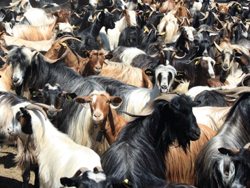Protecting sheep from small ruminant lentiviruses
Small ruminant lentiviruses (SRLVs) are endemic in the European Union. They are responsible for significant economic losses as a result of premature culling, smaller milk yields and a reduction in the number of offspring being born. They also cause a reduction in the weight of lambs and kids and poorer quality meat. At present SRLV infection is managed through diagnosis and culling, which is expensive, while many countries have no control policies in place. The virus is characterised by a slow incubation period, which means the economic impact, although serious, is not immediately apparent. It may take a number of years before the true cost is realised. The MVAC project studied whether new vaccination techniques could provide another area of control measures. The most suitable antigens for achieving protection and the best vaccination strategies were investigated. Researchers evaluated DNA strategies in sheep infected with the maedi visna virus (MVV), which causes encephalitis and chronic pneumonitis. Genes for encoding MVV EV1 pp55gag precursor and gp160 env precursor were cloned. They were then bound to a live attenuated adenovirus, which expressed the recombinant proteins. Additionally, the genes for encoding p55gag precursor were cloned and bound to modified vaccinia Ankara (MVA), a live virus that had been attenuated. The adenoviruses used for encoding p55gag and another envelope protein (gp 150env) were found to be unstable, requiring further work to make them viable. The MVA live virus vector however, was found to function correctly. It was used as an immunogen for prompting the generation of antibodies. The data accumulated in this study can be used in the development of improved vaccine strategies for controlling SRLV infections.







